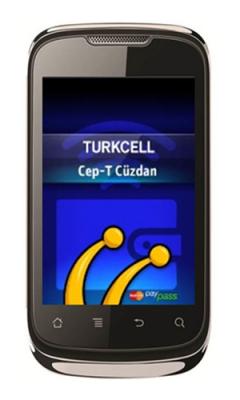Turkcell to Expand NFC Rollout with More Branded Phones, Applications

Turkey’s largest mobile operator, Turkcell, plans to introduce more of its own branded NFC phones and will expand the services available in its mobile wallet beyond payment, the telco told NFC Times.
This follows the launch earlier this month by Turkcell of its own branded Android NFC phone from Chinese manufacturer Huawei. The phone stores MasterCard Worldwide PayPass applications on SIM cards the telco issues.
The operator launched the Huawei handset July 7 and has it on sale in about 1,000 shops in Turkey, as it continues to roll out its NFC mobile wallet, called Cep-T Cüzdan. Subscribers with NFC-enabled SIM cards can pay with a PayPass application issued by either of two banks, Yapı Kredi and Garanti bank, with applications from more banks and other service providers planned to launch by the end of the year, Ergi Sener, product manager for Turkcell’s mobile wallet, told NFC Times.
Turkcell, working with Huawei, brought the Chinese telecom equipment maker’s first NFC-enabled Android phone–known as the U8650NFC Sonic–to market. It’s one of the first NFC-enabled smartphones to roll out anywhere, and the first that supports more than one bank-issued application, noted Turkcell. The phone supports the single-wire protocol standard, enabling secure applications to be stored on SIM cards.
Turkcell, which calls the phone the T20, preloads the mobile-wallet software. The 3G touch-screen handset, which runs Google’s Android Gingerbread operating system, is designed to be an affordable phone. Turkcell subscribers pay an unsubsidized price of about €200 (US$285.65).
The payment applications, from two of Turkey’s largest privately owned banks, are both available, said Turkcell. While Yapı Kredi has announced its commercial PayPass application for the wallet, Garanti has yet to officially launch its own application for the Turkcell SIMs. But Sener said “all MasterCard-branded credit, debit and prepaid cards of Garanti can be added” to the wallet.
Turkcell also is serving as trusted service manager to download and manage secure applications in its wallet. It built the TSM platform in-house with the help of Turkey-based smart card company SmartSoft.
Turkcell commercially launched the NFC service in April with Yapı Kredi, using the well-worn 2G Samsung S5230. The phone, used in a number of trials the past year, is one of the few NFC handsets on the market supporting the single-wire protocol. Turkcell also supports its mobile wallet with a bridge technology, SIMs linked to flexible antennas. These can be inserted into a variety of phones to give them a contactless interface.
Turkcell, which claims more than half of the competitive Turkish mobile market with more than 33 million subscribers, appears to be ready to bring more customized NFC phones to stores, especially handsets that support the single-wire protocol. Sener said there would be other phones like the T20.
“The new handsets that will be launched to market as Turkcell-branded phones are also planned to support UICC (SIM)-based NFC functionality as a default feature,” he told NFC Times. “Thus, we will be working with different vendors for this objective.”
He declined to elaborate, but additional phones from Huawei or ZTE, another Chinese handset maker that produces private-label handsets along with those carrying its own brand, are likely. And ZTE, like Huawei, is introducing relatively low-cost NFC-enabled Android phones.
But he added that the operator plans to put the Cep-T Cüzdan mobile wallet on other phones supporting the single-wire protocol, or SWP, in addition to the Turkcell-branded phones.
Huawei Technologies, which is mainly a supplier of telecom network infrastructure, ranked as the 10th largest maker of mobile phones in the first quarter of 2011, shipping an estimated 7 million units, according to U.S.-based research firm Gartner.
Turkcell introduced its first branded phone, the Android-based T10, last year. The phone, also known as the Huawei u8110, does not have an NFC chip built-in, though Turkcell is issuing SIMs with flexible antennas for the phone.
MasterCard granted a waiver to Turkcell to use the T20 for PayPass, but Sener said the phone is undergoing certification testing for performance and security through MasterCard. The telco uses NFC-enabled SIM cards from France-based Gemalto, which are already certified by MasterCard.
After the United Kingdom, Turkey has the largest acceptance infrastructure for contactless open-loop payment in Europe, with 46,000 merchant terminals in place that can accept PayPass, said Sener.
He predicted transit and other ticketing applications, along with loyalty, would be available for the Turkcell wallet by the end of 2011. Transit ticketing in particular will be important to encourage consumers to adopt the wallet, he said. Several Turkish cities, including Istanbul and İzmir, have contactless readers in place for transit fare collection.
“Since mass transit applications are used in daily basis, we think that they will be the catalyst for penetration,” Sener said. “We have been working with some transport operators, but we cannot give an exact time frame for the launch of these transit applications yet.”
Turkcell had hoped to commercially launch NFC before the end of last year. It faces competition for mobile payment in the market, including a service launched by Garanti and Turkish mobile operator Avea, using SIMs with flexible antennas. One or more Turkish banks also might launch mobile payment using bridge technologies.












